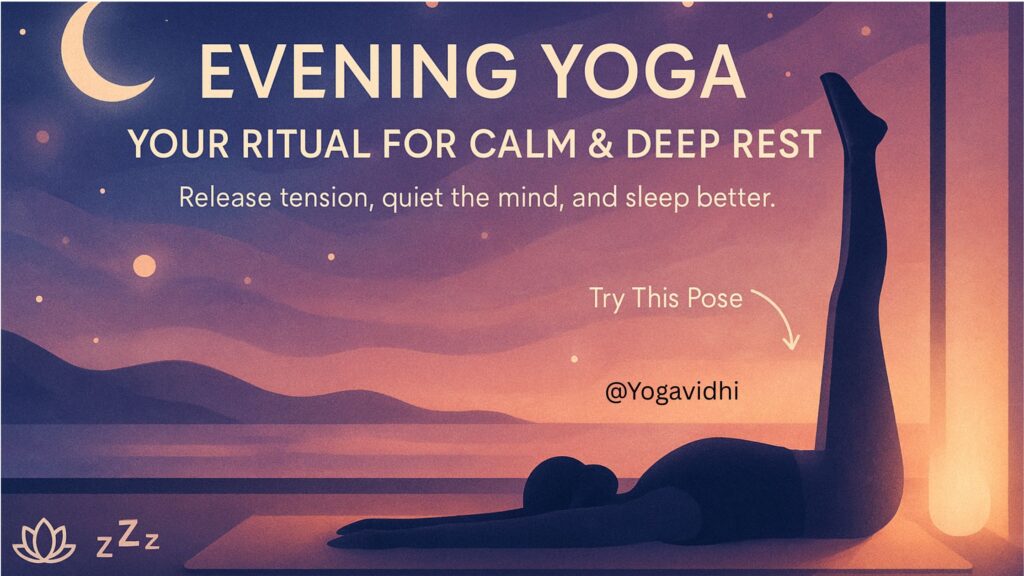After a long, hectic day filled with responsibilities, deadlines, and mental clutter, our bodies and minds crave calm. Enter evening yoga—a gentle, restorative practice that helps you release tension, calm your mind, and transition peacefully into rest. Whether you’re battling anxiety, struggling with sleep, or simply looking for a way to wind down, evening yoga can be your nightly ritual for wellness and deep rest.
In this guide, we’ll explore everything you need to know about evening yoga—from its benefits to specific poses and routines. Let’s dive into the ultimate way to end your day on a grounded, peaceful note.
Evening yoga is the practice of doing yoga in the late afternoon or evening, typically to help unwind and get ready for sleep. It usually includes gentle, soothing poses and calming breathing techniques that help relax the body and mind while letting go of the day’s built-up tension.
Table of Contents
What Is Evening Yoga?
Evening yoga is a calming yoga practice typically done in the late afternoon or before bedtime. Unlike a morning yoga session that energizes the body for the day ahead, evening yoga focuses on slowing down, relieving stress, and preparing both body and mind for a good night’s sleep.
The primary goal of evening yoga isn’t to build strength or stamina—it’s to help you decompress, release accumulated tension, and ease into relaxation. This practice often includes deep stretches, slow flows, gentle breathwork, and mindfulness or meditation.
Whether you’re working a 9-to-5 or juggling household duties, incorporating a night yoga routine can dramatically improve how you feel—physically, emotionally, and mentally.
Benefits of Practicing Yoga in the Evening
Here’s why making time for evening yoga could be the most impactful self-care habit you add to your day:
1. Reduces Stress and Anxiety
Evening yoga helps to balance your nervous system, shifting you from the stressful “fight or flight” mode to the calming “rest and digest” state. Just 15 minutes of gentle yoga can significantly reduce cortisol (the stress hormone) and enhance feelings of peace.
2. Improves Sleep Quality
If you struggle with insomnia or restless nights, bedtime yoga poses help activate the parasympathetic nervous system, preparing your body for deeper and more restful sleep. Poses like Legs-Up-The-Wall and Forward Fold can calm your heart rate and quiet your mind.
3. Releases Physical Tension
Hours of sitting, standing, or working on screens leave us with tight hips, tense shoulders, and stiff backs. Evening yoga stretches those overworked muscles, restoring flexibility and reducing discomfort before bedtime.
4. Clears Mental Clutter
Ending your day with intentional movement and breath helps declutter the mind. Evening yoga creates space for gratitude, reflection, and clarity—helping you sleep with a lighter heart and a quieter mind.
5. Enhances Emotional Balance
Through mindfulness and movement, evening yoga cultivates inner peace. It can improve your mood, reduce irritability, and promote emotional resilience—especially after a stressful day.
Best Evening Yoga Poses to Relax and Recharge
A successful evening yoga practice relies on calming poses that promote relaxation, not stimulation. Here are some of the best asanas to include:
1. Child’s Pose (Balasana)
A gentle stretch for your back, hips, and knees. This pose promotes deep rest and emotional release.
2. Legs-Up-The-Wall (Viparita Karani)
Reverses blood flow, soothes swollen feet, and relaxes the nervous system. Perfect before bed.
3. Seated Forward Fold (Paschimottanasana)
Stretches the spine, hamstrings, and calves while encouraging introspection and calm.
4. Reclined Spinal Twist (Supta Matsyendrasana)
Relieves tension in the spine and aids digestion, supporting a restful sleep.
5. Supine Butterfly Pose (Supta Baddha Konasana)
Opens the hips and chest while grounding your energy and emotions.
6. Corpse Pose (Savasana)
This final relaxation pose helps absorb the benefits of your practice and prepares your body to sleep deeply.
These bedtime yoga poses are deeply therapeutic and require no prior yoga experience—making them ideal for beginners and seasoned practitioners alike.
Read More: Morning Yoga: Start Your Day with Energy, Clarity, and Calm
Read More: Karma Yoga: The Transformative Power of Selfless Action
Sample 15-Minute Night Yoga Routine
Not sure how to get started? Here’s a simple, soothing night yoga routine you can try tonight:
1. Seated Neck Rolls – 1 minute
Begin in a comfortable seated position. Roll your head gently side to side to release neck tension.
2. Cat-Cow (Marjaryasana/Bitilasana) – 2 minutes
Move through your spine slowly to warm up and release the back.
3. Seated Forward Fold – 2 minutes
Stretch the hamstrings and calm the nervous system with long, steady breaths.
4. Legs-Up-The-Wall – 3 minutes
Place a pillow under your hips and rest with your legs up for ultimate relaxation.
5. Supine Twist – 2 minutes each side
Loosen up the spine and reduce lower back discomfort.
6. Savasana – 3 minutes
Lie flat with eyes closed, breathe deeply, and allow your body to melt into the floor.
Optional Add-ons:
- Burn calming essential oils like lavender or sandalwood
- Dim the lights and play soft instrumental music
- End with a gratitude reflection or mantra
Breathing Techniques & Meditation for Evening Calm
Pairing breathwork with yoga multiplies the calming effect. Here are some simple techniques:
1. Deep Belly Breathing (Diaphragmatic Breathing)
Inhale for 4 counts, exhale for 6 counts. This helps slow your heart rate and induce relaxation.
2. Alternate Nostril Breathing (Nadi Shodhana)
Balances energy, clears mental fog, and promotes sleep. Inhale through one nostril, exhale through the other.
3. Guided Meditation or Yoga Nidra
A 5–10 minutes body-scan meditation can help release lingering tension and prepare your mind for sleep.
Evening Yoga Tips for a Consistent Routine
Staying consistent is key to reaping the long-term benefits of evening yoga. Here are a few practical tips:
- Time it right: Practice at least 30–60 minutes after dinner for comfort
- Create a calming space: Use dim lighting, quiet music, and aromatherapy
- Choose slow and gentle flows: Skip power yoga or heated styles
- Turn off electronics: Disconnect from screens before practice
- Make it a ritual: Keep a dedicated yoga mat or journal nearby to remind you daily
Common Mistakes to Avoid in Evening Yoga
- Doing intense, fast-paced yoga too close to bedtime
- Practicing in a noisy or cluttered space
- Skipping final relaxation or rushing through poses
- Expecting instant results—relaxation is a process, not a switch
Who Can Benefit Most from Evening Yoga?
Evening yoga is for everyone—but especially beneficial for:
- Working professionals battling burnout and stress
- Students managing screen time and mental overload
- Parents needing emotional balance and physical relief
- Seniors looking for gentle movement and better sleep
- Anyone with insomnia, anxiety, or chronic fatigue
Evening Yoga vs. Morning Yoga: Which One’s Better?
| Criteria | Morning Yoga | Evening Yoga |
| Purpose | Energize, awaken | Relax, wind down |
| Style | Dynamic, uplifting | Gentle, restorative |
| Benefits | Boosts focus, metabolism | Improves sleep, reduces stress |
| Ideal For | Starting the day strong | Ending the day calmly |
There’s no “better”—just what aligns with your lifestyle. Many practitioners even enjoy both!

Final Thoughts: Make Evening Yoga Your Nightly Ritual
Evening yoga isn’t just a fitness activity—it’s a daily invitation to pause, breathe, and reconnect with yourself. In just 10 to 20 minutes, you can shake off the weight of the day and enter a space of calm and clarity.
Start small. Be consistent. And let the power of evening yoga guide you to a more peaceful and restorative sleep—night after night.
“Let the silence of your breath guide you home.”
Frequently Asked Questions (FAQs):
Q. What type of yoga is best for the evening?
Ans: Restorative, Yin, and gentle Hatha yoga are ideal as they emphasize relaxation and mindfulness.
Q. Can I do yoga right before sleeping?
Ans: Yes! As long as the practice is gentle and calming, evening yoga can be done 15–30 minutes before bed.
Q. How long should an evening session last?
Ans: Even 10–20 minutes is enough. Consistency matters more than duration.
Q. Is it okay to eat before evening yoga?
Ans: Avoid practicing on a full stomach. Wait at least 30–60 minutes after a light dinner.
Q. Is evening yoga good for sleep?
Ans:Yes, evening yoga is highly effective for improving sleep quality. Practicing gentle stretches and calming breathing techniques before bed helps relax the nervous system, release physical tension, and quiet the mind. Poses like Legs-Up-The-Wall, Child’s Pose, and Reclined Spinal Twist are especially helpful in preparing your body for deep, restful sleep. Evening yoga reduces stress hormones like cortisol and activates the parasympathetic nervous system, making it easier to fall—and stay—asleep naturally.
Q. Is evening yoga effective?
Ans: Incorporating yoga into your evening routine can offer tremendous benefits, such as better sleep, reduced stress, and enhanced flexibility. The best part is that even a short, gentle session can provide these advantages—there’s no need for an intense or lengthy practice.
Declaration Note:
We use third-party videos and images on https://yogavidhi.com/ for educational and illustrative purposes. All rights belong to their respective owners. No copyright infringement is intended.



